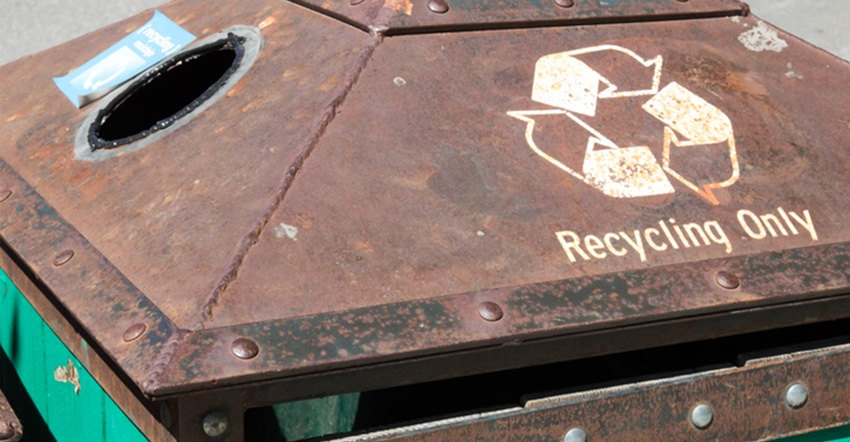Industry And Government Collaboration Key To Addressing Recycling Challenges (Commentary)

The COVID-19 pandemic has brought about major changes to daily life across the United States. For many, homes and apartments are now serving double and triple duty not only as family residences but as workspaces, classrooms and childcare centers. This new normal has created new challenges for many recycling systems -- specifically showing how outdated recycling infrastructure and reduced community recycling budgets are struggling to handle the increased share of recyclables generated in the home as people spend more time there. Yet with the right combination of education, investment and collaboration, we can transform the recycling system in the United States. Together, we can modernize infrastructure so it keeps valuable materials in manufacturing supply chains to be remade into new products as part of a circular economy.
We at the American Beverage Association, Closed Loop Partners, and The Recycling Partnership believe that now more than ever, local governments, businesses and nonprofits alike must work together to find solutions that enhance recycling systems and make them as effective, safe and sustainably-funded as possible. Building a better system without waste in the U.S. and a stronger, more resilient circular economy is possible through collaborative, cross-industry partnerships that are financially sustainable and have strong environmental outcomes.
Together, we’ve spent the last year working in local communities to increase recycling rates of the beverage industry’s 100% recyclable bottles and cans. We’re seeing real results by sharing recycling best practices with communities, helping more than 349,000 households recycle nearly 38 million new pounds of polyethylene terephthalate (PET) plastic over ten years through investments to upgrade recycling infrastructure - like bins and carts, collection vehicles and sorting technology.
October 29th marked the first anniversary of the Every Bottle Back initiative - our public-private partnership between The Coca-Cola Company, Keurig Dr Pepper and PepsiCo, and environmental leaders Closed Loop Partners, The Recycling Partnership, and the World Wildlife Fund to increase the amount of valuable recyclable plastic beverage bottles that are collected and remade into new ones, so we use less new plastic.
Building on our shared commitment to preserve the environment, Every Bottle Back has made a series of regional investments to improve recycling systems in key areas including the Dallas-Fort Worth metroplex, Broken Arrow, Okla., and Kenosha, Wis. Residents in these cities are gaining access to the tools and infrastructure needed to increase recycling rates and build a circular economy, preventing valuable recyclables from ending up where they don’t belong, such as waste in landfills or as litter in oceans, lakes, parks and roadways. These investments are the first of many initial projects that have committed funding under Every Bottle Back.
This work means real change for real people. For example, in the Dallas-Fort Worth metroplex, multi-family apartments are receiving targeted recycling education and equipment as a part of a unique grant which will dramatically increase their ability to recycle effectively. In Kenosha, Keir Powell, the town’s waste superintendent, is excited that the grant will upgrade the town’s recycling by allowing residents to end the current practice of leaving bagged recyclables at the curb. Instead, Kenosha’s residents will transition to larger and cleaner recycling carts, allowing them to recycle more items more easily. For Keir, this means that his employees will have an improved work environment. These investments will make it more efficient for residents to recycle. Contactless, automated cart pickup will make it safer for employees. And, through the distribution of educational materials, residents will learn what can and can’t be recycled, meaning lower contamination rates.
Altogether, the initiation of modernization projects in these communities will keep our valuable plastic bottles in the supply chain to be remade into new bottles, in addition to supporting local jobs and reducing landfill and waste collection costs. Better for people, better for the environment.
Recycled goods are the main way that manufacturers get the supply needed to remake products with recycled materials. Large companies, including members of the American Beverage Association, are committed to reducing their plastic footprint by using recycled materials in their products and packaging. There is a strong demand for recycled content, but the supply is limited.
Community recycling budgets have always been tight, but in a post-COVID environment, local governments will have to squeeze into even tighter budgets to juggle how and if recycling fits into their critical public services. This holds challenges for not only meeting the material demands of today but also the ability of the system to respond to increased demand. Currently, more than 20 million tons of household recyclables, which represents more than half of all possible residential recyclables, are being wasted in landfills instead of properly recycled and remade into new products.
Partnership between industry, environmental groups and local governments is critical for effectively capturing recyclables across the United States and moving American communities toward a better future and a circular economy for recyclable materials. Our hope is that Every Bottle Back serves as a blueprint for industries and localities nationwide to work together towards long-term sustainability solutions to increase access to recycling and reduce the use of new plastic, especially at a time when systems are experiencing more challenges than ever before.
About the Author(s)
You May Also Like


